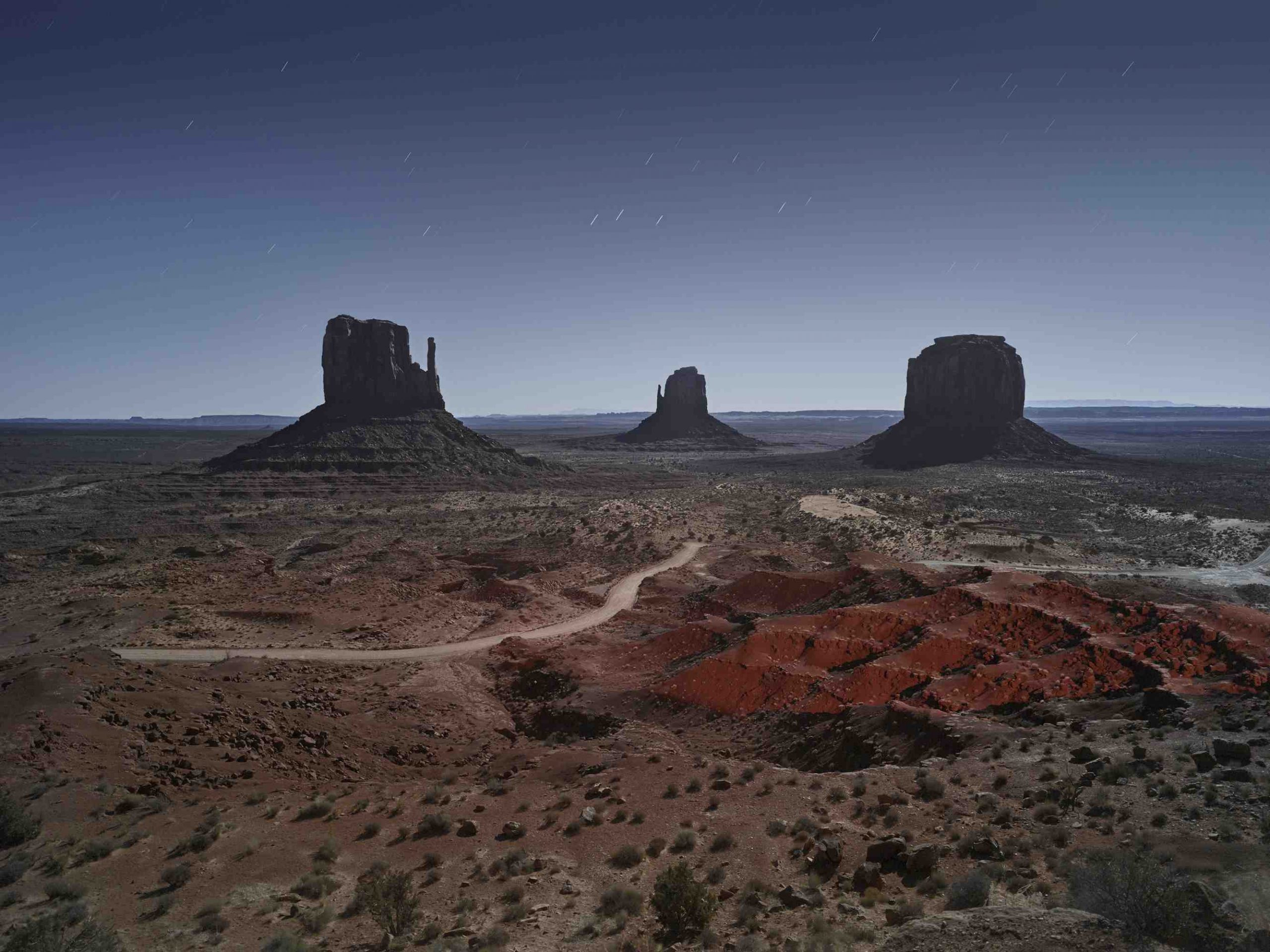The cinematic drama of a declining empire
- Text by Miss Rosen
- Photography by Luca Campigotto

Hailing from Venice, Luca Campigotto arrived in the United States for the very first time in 1981 at the tender age of 19. Dazzled by the country he had only known through photography and film, he felt a profound connection to a nation fueled by the mythic American Dream.
“The night I left, flying over New York, I said to myself: ‘One day I want to live here,’” he recalls. As fate would have it, in 2012, Campigotto moved to New York and immediately felt at home in a world he recognised from the work of photographers such as Weegee, Diane Arbus, and Joel Meyerowitz as well as filmmakers Martin Scorsese, Francis Ford Coppola, and Sidney Lumet.

The Navajo Trail, Route 160, near Durango, Colorado, 2018
“As a foreigner, living in the United States has always been like stepping into one of those films. At a certain point you want to become part of it,” Campigotto says. “New York has cultivated and spread its myth around the world just like my Venice did in late Middle Ages.”
Fuelled by a passion for travel photography, Campigotto set forth to photograph America’s wild landscapes, industrial areas, and cities at night. The images feel animated and alive, even though there are no people in the frame.
Describing his work as “the art of escape” into a world that he has imagined through books and period films, Campigotto crafts a cinematic tribute to an empire in decline in the new book American Elegy (Silvana).

Glendale, Utah, 2018

Butte, Montana, 2019
“A lot of what has nourished both my knowledge and my fantasies about this country seems to me no longer exists,” says Campigotto. “But my passion was not affected. Rightly or wrongly, mine is a sincere and faithful love. And as in a love story, sometimes it seems to matter more what we thought it could be than what it really was.”
Adopting a slow, immersive approach, Campigotto set off to see America by car, crafting a series of poignant, elegiac photographs accompanied by poetic reflections of his journey. “My Venetian streak is ironic, often even cynical, but American Elegy is a sentimental journey,” he says.

Soho, New York, 2009
As the book progresses, Campigotto finds splendor and majesty in tropes that have become cliché, transforming road trips, motels, gas stations, diners, abandoned cars, and faded signage into paeans of lost grandeur. “I always say that photography is the supreme tool of nostalgia. I try to use my camera like a time machine,” he says. “Taking photographs consoles us; it tells us that we love the world around us — that we are able to rescue something that was being lost.”
“Photographing industrial archeology, I want to underline the heroic figure of what is left, despite everything. Something that has come a long way and has resisted at all costs. There is something sublime in rust, in verdigris… like contemplating the passage of time in the sand of an hourglass.”

Monument Valley, Utah, 2018

Wendell, Idaho, 2019

Butte, Montana, 2019

Butte, Montana, 2019

Williamsburg, New York, 2012

Butte, Montana, 2019

Monument Valley, Utah, 2018
American Elegy is available now.
Enjoyed this article? Like Huck on Facebook or follow us on Twitter and Instagram.
You might like

Largest-Ever Display of UK AIDS Memorial Quilt Opens at Tate Modern
Grief Made Visible — Comprising hundreds of panels made by lovers, friends and chosen family, the UK AIDS Memorial Quilt returns in full for the first time since 1994 – a testament to grief, friendship and the ongoing fight against HIV stigma.
Written by: Ella Glossop

In Medellín’s alleys and side streets, football’s founding spirit shines
Street Spirit — Granted two weeks of unfettered access, photographer Tom Ringsby captures the warmth and DIY essence of the Colombian city’s grassroots street football scene.
Written by: Isaac Muk

Remembering New York’s ’90s gay scene via its vibrant nightclub flyers
Getting In — After coming out in his 20s, David Kennerley became a fixture on the city’s queer scene, while pocketing invites that he picked up along the way. His latest book dives into his rich archive.
Written by: Miss Rosen

On Alexander Skarsgård’s trousers, The Rehearsal, and the importance of weirdos
Freaks and Finances — In the May edition of our monthly culture newsletter, columnist Emma Garland reflects on the Swedish actor’s Cannes look, Nathan Fielder’s wild ambition, and Jafaican.
Written by: Emma Garland

Why Katy Perry’s space flight was one giant flop for mankind
Galactic girlbossing — In a widely-panned, 11-minute trip to the edge of the earth’s atmosphere, the ‘Women’s World’ singer joined an all-female space crew in an expensive vanity advert for Jeff Bezos’ Blue Origin. Newsletter columnist Emma Garland explains its apocalypse indicating signs.
Written by: Emma Garland

We are all Mia Khalifa
How humour, therapy and community help Huck's latest cover star control her narrative.
Written by: Alya Mooro

